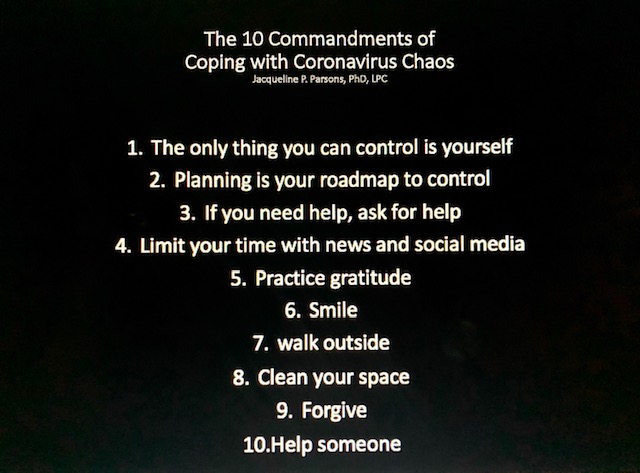1. The only thing you can control is yourself.
The only type of control you have in the world is over yourself - your thoughts, your reactions, how you interact with the world. If you’re a parent, when you’re attempting to control your kids, actually what you’re doing is influencing their behavior with boundaries, positive and negative feedback, love and role modeling. Remember- the way you act in front of your kids will be imitated by them later, usually in front of company.
2. Planning is your roadmap to control
Planning is great for you. By writing down your goals, appointments, to do lists and so on, you’re creating a visual representation of your structured day. It feels great to check off things on your "To-Do" list that you’ve accomplished. Planning decreases the anxiety of the unknown because you literally have a beginning and an ending point. Some people keep their schedule on their phone and others use a physical planner. There is a community of individuals that have made written planning into an art, with planning stickers. Planning stickers make written planning stylish and they are functional- you can color code your day. Plus, planning stickers are effective fun tools for teaching kids how to plan. A great place to learn about planning stickers is at Savanna Paper Company,
savannahpaperco.com
3. If you need help, ask for help
Over the past few weeks, the world has been turned upside down. Some individuals are telecommuting, others have been laid off or are unable to go to work. Many that live paycheck to paycheck don’t have the money for food and other basic living necessities. Please know there are food banks and agencies that provide assistance with bills, rent and food, such as the United Way at 1-866-211-9966. Also, for those that attend AA or are in need of support, Alcoholics Anonymous Is offering online and phone meetings.
4. Limit your time with news and social media
Many of us are experiencing pandemic panic, watching 24 hour news coverage of everything coronavirus related or discussions about the outbreak on Facebook and other online social platforms. Don’t completely eliminate social media, but consider only checking these platforms no more than twice a day only.
5. Practice gratitude
There are several studies demonstrating that people who practice gratitude are happier, have better relationships, sleep better, are more optimistic and have stronger immune systems. Practicing gratitude is simple-it’s recognizing the good in your life. You can make gratitude a part of your day in a variety of ways, such as keeping a daily gratitude journal, telling someone that you love and appreciate them, smiling more often and being kind to others.
6. Smile
Smiling is very important for good mental health. A grin can boost your immune system, because smiling releases endorphins. It’s also good for the prevention of wrinkles, because you use less facial muscles smiling versus frowning. A smile can also elevate your mood, because it triggers the release of mood boosting neurotransmitters such as dopamine and serotonin. Smiling literally is a natural antidepressant.
7. Walk outside
Spending time outside is excellent for you. Walking can boost dopamine and endorphins. Sun exposure is also beneficial because it increases your body‘s production of Vitamin D and serotonin levels which combats anxiety and depression.
8. Clean your space
Cleaning helps you gain a sense of control over your environment. A clean space helps calm your mind, thus promoting positive mental health. Plus when you clean, you’re exercising, which stimulates mood boosting neurotransmitters, which have a positive effect on how you feel. Cleaning and organizing for about 15 to 30 minutes each day can lead to a sense of serenity and satisfaction. If you typically have a messy space, consider starting off by just making your bed each day. There really is a sense of accomplishment when your environment looks better, even if it's incremental.
9. Forgive
With the coronavirus outbreak, there have been many unexpected occurrences. Children are now at home versus school and many people have lost their jobs. Our lives have been disrupted, which can lead to anger and resentment. When you make the choice to forgive, it can also lead to compassion for the person that wronged you. Whether you need to forgive someone else or yourself, letting go of negative feelings leads to a better quality of life. Remember, anger and resentment are like bricks in your backpack; the only person these bricks are weighing heavily on is you.
10. Help someone
During a period of social distancing, the concept of helping someone else may seem foreign, but it’s possible. If you have an elderly neighbor or someone with mobility issues or a chronic condition that limits their ability to leave their home, you can offer to get groceries, pharmaceuticals or to walk their dog. Donating to your local blood bank or a local food bank helps the community at large. When you help someone, you are actually helping yourself because altruism decreases symptoms of depression and anxiety.
